Beef Effects on the Body (Cooked)
Nutritionist Michael Joseph publishes the Nutrition Advance website in the Usa which provides independent, evidence-based diet and health information backed by peer-reviewed studies every bit evidence. Here he takes a closer look at the health benefits of beefiness.

A generation or two ago, our parents and grandparents viewed beefiness as a nutritious health nutrient.
Just at present? These days it'southward much different, and opinion is split between whether beef is healthful or harms our health.
Some of the more extreme vegan views even call for the regime to remove meat from the nutrient supply.
Whatever our opinion on crimson meat might be, at that place are some of import wellness benefits of eating beef.
This article takes a close look at 11 of them.
1. Beef Provides a Large Source of L-Carnitine
L-carnitine is an amino acid that occurs naturally in meat products.
In the table below, we can run into the L-carnitine content of beef compared to some other beast foods and constitute foods (i);
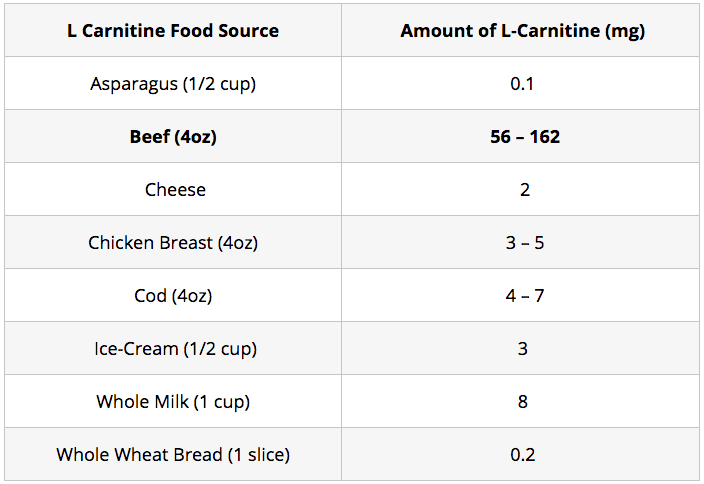
Why is L-Carnitine Important?
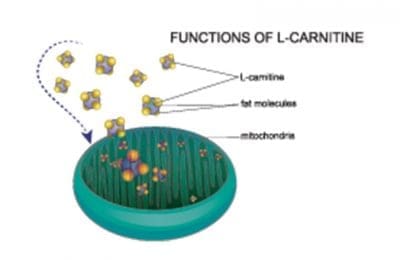 Amid other functions, L-carnitine plays a role in fat metabolism.
Amid other functions, L-carnitine plays a role in fat metabolism.
As office of this, L-Carnitine does the job of transporting fats into our mitochondria for burning.
It's important to clarify that our torso can synthesize sufficient amounts of Fifty-carnitine for general needs; this makes it a not-essential amino acid.
The body synthesizes Fifty-Carnitine within the liver and the procedure relies on the amino acids Fifty-lysine and Fifty-methionine (2).
As a result, deficiencies are rare.
Notwithstanding, enquiry suggests that a higher dietary intake of 50-Carnitine may accept some positive health impacts.
Various studies show the following findings;
Heart Health
A meta-analysis of randomized trials suggests that Fifty-carnitine improves patient outcomes. Specifically, it exerts an effect on hypertension, oxidative stress, nitric oxide, and inflammation.
A further systematic review found that L-carnitine is associated with a 27% reduction in all-cause mortality in middle failure patients (3, 4).
Diabetes
A systematic review shows that higher L-carnitine intake in type ii diabetes patients improves fasting glucose levels and the overall cholesterol profile (v).
Weight Loss
According to a systematic review and meta-assay of nine randomized controlled trials, subjects using L-carnitine supplementation lost "significantly more weight" than the control group (6).
Information technology's worth noting that while there are many L-carnitine supplements effectually, the absorption rate is poor in comparison to beef.
In fact, our body only absorbs around 14-eighteen% of the constructed form of the nutrient (7).
Key Point: L-carnitine is an amino acid that naturally occurs in beef. It has a positive impact on various wellness markers.
2. Beef Provides the "Master Antioxidant" Glutathione
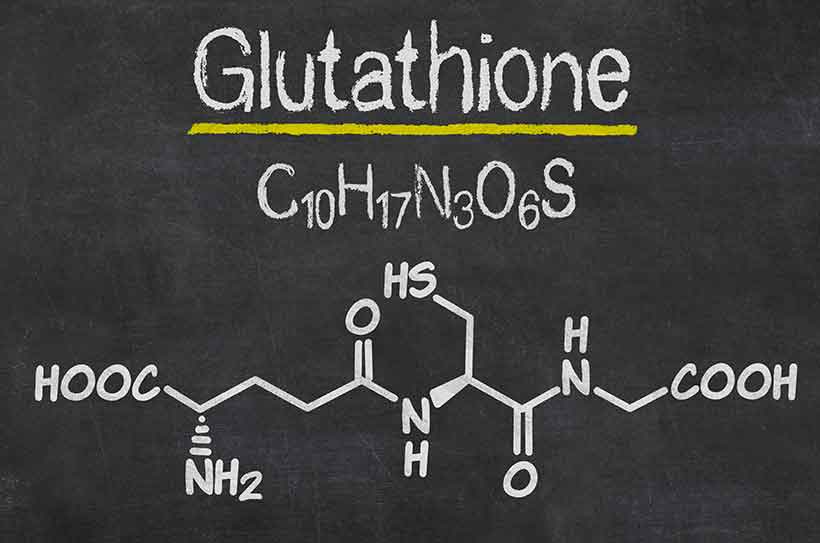
Unremarkably known as the 'master antioxidant,' glutathione has a score of research linking it to (8);
- Anti-aging benefits
- Increasing longevity
- Preventing illness
- Reducing the risk of chronic illness
- Strengthening the immune organization
It helps protect every cell in our torso from cellular impairment, which can lead to many chronic diseases.
On the other hand, a deficiency in glutathione contributes to oxidative stress and inflammation (9).
As a result, keeping glutathione levels high is important for our overall wellness.
After, the question becomes "how tin can we keep our glutathione levels high?"
Endogenous Glutathione Production and Dietary Sources
Outset of all, our trunk produces glutathione endogenously.
In other words, our body uses raw materials (in this case: amino acids) to make glutathione.
For this process to occur, we should have acceptable levels of the amino acids cysteine, glutamate, and glycine (10).
These amino acids are known as glutathione precursors, and each of these amino acids is nowadays in beef.
On the positive side, beefiness too contains a reasonably high source of complete (pre-formed) dietary glutathione.
Key Point: Keeping our glutathione levels high is disquisitional for good health, and beefiness is a nutrient that helps u.s.a. to achieve this. Glutathione detoxes our body improve than any 'detox plan' or supplement tin.
iii. Beef is Loftier in Protein and Helps Amend Muscle Mass

There are numerous reasons why we should strive to ensure a sufficient protein intake and these include;
- Poly peptide is the building block our body uses to repair and make bone, skin, and cartilage.
- Sufficient protein helps the states to build and maintain lean muscle mass.
- Out of all macronutrients, protein is the well-nigh satiating, and information technology discourages nutrient cravings.
Beef is packed with wellness-promoting amino acids, and it's 1 of the unmarried biggest sources of protein in the human nutrition.
For instance, a 6oz (170g) portion of 80% lean beef provides 46g poly peptide.
Should we opt for a leaner variety of beef, the poly peptide content can be even college (11).
The Importance of Lean Mass
As we age, building—or at to the lowest degree holding on to—lean mass should be a priority.
Inquiry shows that older adults with lower muscle mass are at a higher take a chance of bloodshed.
Speaking bluntly, the more skeletal muscle mass someone loses as they age, the college their take a chance of an before decease (12).
Also, the rate of musculus protein synthesis rapidly drops as we age, making information technology a lot harder to build and maintain musculus (13).
Considering this, we should ensure nosotros're eating a sufficient amount of protein – this is peculiarly essential for elderly people.
On this note, beefiness is i of the best protein-rich foods out in that location.
Key Signal: Protein is essential for optimal wellness, and especially so every bit nosotros historic period. Beef provides an abundant amount of this macronutrient.
4. Beefiness is Extremely Rich in Minerals
If you're looking to increase your intake of various minerals, then beefiness is i of the best options to consider.
First of all, beef is relatively nutrient-dumbo in minerals.
Here we can see the mineral content of 80% lean beef (11);
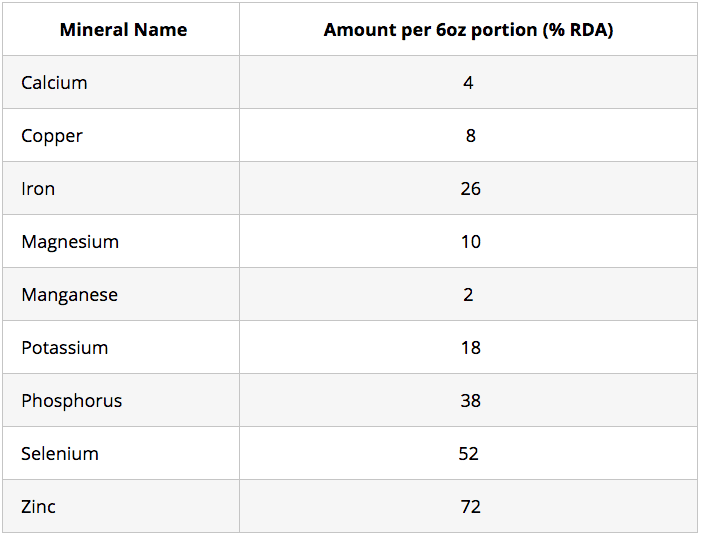
As shown in the table, beef provides more than one-half of the day's recommended amount of selenium and zinc.
Many people accept deficiency issues with some of these minerals.
So, the nutritional value of beef can aid fight prevalent global deficiencies in iron, magnesium, and zinc (14, 15, 16).
Key Bespeak: Beefiness is rich in several essential minerals—especially fe, phosphorus, selenium, and zinc.
5. Eating Beefiness Helps Prevent Iron Deficiency Anemia
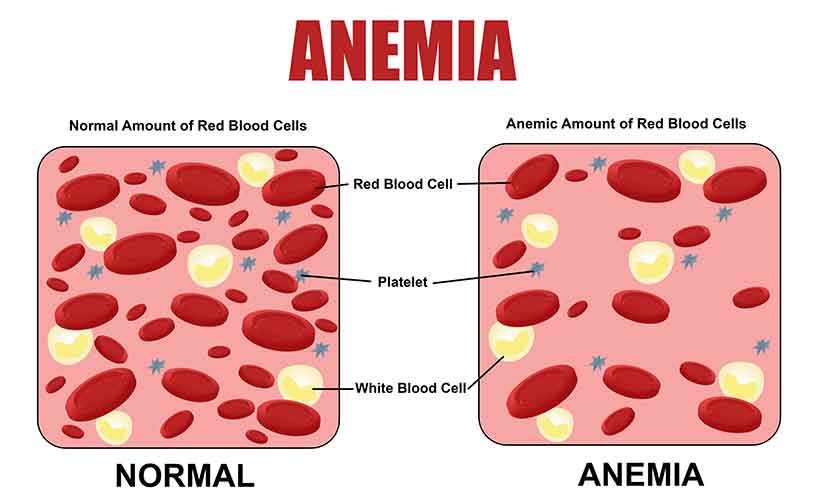
Nosotros touched on mineral deficiencies in the terminal point, only iron deficiency anemia deserves a mention of its own.
Sadly, iron deficiency anemia is a growing epidemic effectually the globe.
In a developed state such equally the U.s.a., nutrient deficiencies shouldn't exist a cause of death, yet anemia kills thousands every year.
To be exact, the latest release of statistics showed that Anemia hospitalized 146,000 Americans in one year. v,219 of these people died (17).
Globally it's even worse, and co-ordinate to the World Wellness Organization, 1.62 billion people suffer from iron deficiency anemia (18).
Heme and Non-Heme Fe
There are ii types of iron bachelor in food, and nosotros refer to them as heme and non-heme atomic number 26.
- Heme Iron: Heme atomic number 26 is the virtually bioavailable form of iron, and meat and other fauna foods exclusively incorporate it.
- Not-Heme Iron: Non-heme fe is found in plant foods such as fruit, vegetables, and basics. In comparison to heme iron, our torso finds it more difficult to absorb.
One of the best health benefits of beef meat is that it contains a substantial amount of heme iron.
The all-time source of all? Beef liver.
Interestingly, anemia disproportionately affects females. Perchance this isn't a huge surprise when we retrieve nigh how society seems to shame women who eat meat.
The imagery of women smiling while eating a bowl of salad is quite ubiquitous.
Key Point: Eat more beef to assistance prevent iron deficiency anemia.
half-dozen. Beef Contains Carnosine, a Potent Amino Acid
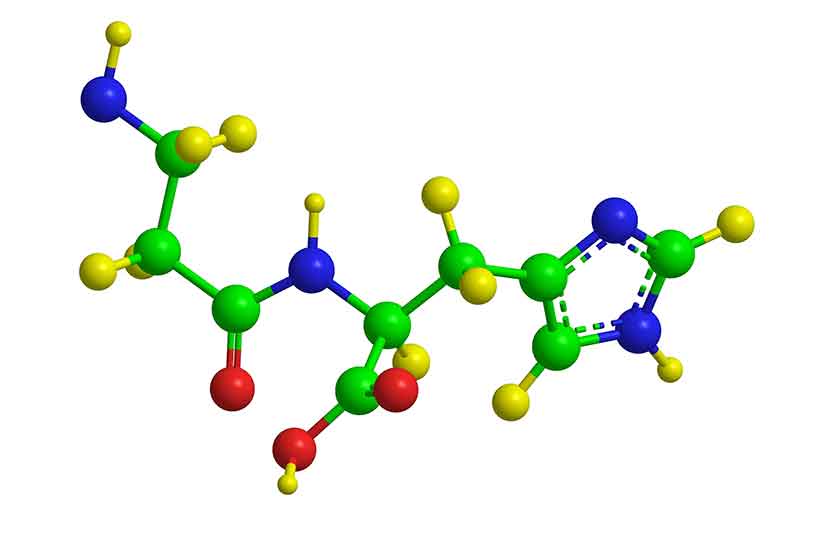
Another advantage of eating beefiness is that it provides an abundance of carnosine.
Carnosine (beta-analyl-L-histidine) is an amino acid found throughout the body, and it has several important roles in human health.
As beef is one of the highest sources of carnosine (containing well-nigh 50% more than than poultry), this is another wellness benefit.
What Does Carnosine Practice?
For i thing, carnosine has anti-glycosylation backdrop.
To exist verbal, carnosine reduces the harms of a process called 'glycation' which involves advanced glycation end-products (AGES).
Glycation is cardinal to the crumbling process and progressively damages our body, potentially leading to atherosclerosis and various other chronic diseases (19, 20).
Additionally, carnosine helps boost the immune system and reduce inflammation. The amino acrid is also thought to help prevent lipid peroxidation within our cells (21, 22).
Key Point: Beefiness (and ruby-red meat in general) is the best dietary source of carnosine.
seven. Beefiness is Full of Vitamins
There are many important nutrients in beef, and those present in significant amounts include the range of B vitamins (11);
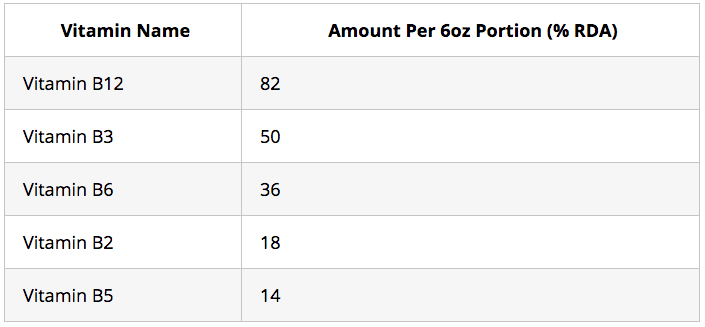
Additionally, beef also contains smaller amounts of vitamins E and 1000.
Vitamin B12 (cobalamin) is a notably essential nutrient, and this is considering it is only available from animal foods.
This vitamin also has a wealth of benefits that include skin improvements, positive mood, better sleep, and neural regeneration (23, 24).
It's important to realize that bereft vitamin B12 may likewise increment the take chances of depression and mental wellness problems (25, 26).
Fortunately, a 6oz serving of beef provides almost 100% of the recommended amount of B12.
Those most at risk from B12 deficiency are vegetarians/vegans, and these groups should supplement with the vitamin.
Key Point: Beef is high in B vitamins which help promote health. Vitamin B12 is especially important since it isn't nowadays in plant-based foods.
viii. Conjugated Linoleic Acid
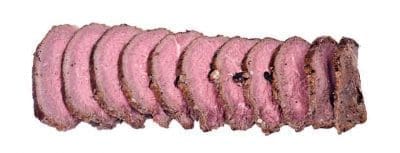 Otherwise known every bit CLA, conjugated linoleic acid is a naturally occurring trans-fat.
Otherwise known every bit CLA, conjugated linoleic acid is a naturally occurring trans-fat.
Don't worry, although the "trans-fatty" name is a petty scary, it has a very different effect to the synthetic version.
Randomized controlled studies involving human participants propose that;
- Conjugated linoleic acid helps to improve insulin sensitivity (30)
- CLA appears to promote fat loss (31, 32)
Notably, the bulk of the prove suggests that getting CLA from real food is better than supplementation (33).
As is usually the case, perchance nutrients in whole foods have a different effect to a synthetic pill?
Food Sources of CLA
The top sources of CLA include meat and dairy products.
After lamb and sure cheeses, beef is the adjacent highest provider of the food.
Although all beef contains CLA, grass-fed meat offers a significantly higher amount than beefiness from not-ruminants.
Specifically, the boilerplate amount of CLA in grass-fed beef is 0.46% of the fatty content.
With grain-fed beef, this average content drops to 0.sixteen% of fat (34).
Fundamental Point: Beef—especially from grass-fed cows—is 1 of the highest sources of conjugated linoleic acid.
9. Beef Contains the Performance Enhancer Creatine
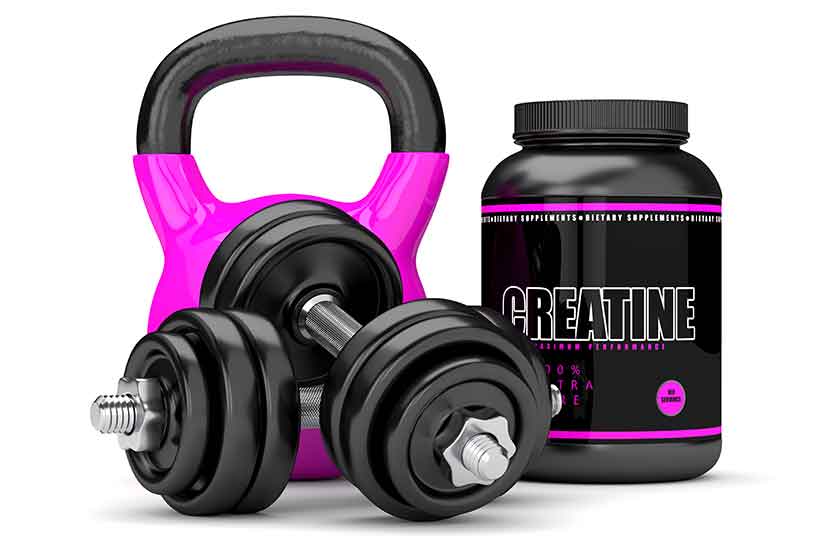
Almost everyone knows the dietary supplement version of creatine, just did you know that beef contains it likewise?
In fact, beefiness typically contains 350mg creatine per 100g (35).
The health benefits that creatine bring include;
- Improved exercise performance
- Creatine assists in muscle growth and development
- Provides muscles with greater energy supply and improves endurance
- Increased muscular size
It's too worth noting that our liver tin produce well-nigh 2g creatine per mean solar day, depending on the pre-cursors beingness available.
Creatine precursors include arginine, glycine, and methionine (36).
Not only are all of these amino acids nowadays in beef, but beefiness is one of the single most significant dietary sources for them.
In other words, eating beef gives you lot a decent amount of dietary creatine, and it helps your body to produce information technology too.
Key Point: Beef has two positive impacts on creatine levels. Firstly, information technology straight provides it to the body and secondly, it helps the body to make information technology.
ten. Beefiness is Very Affordable
 We may hear how beef is so much more expensive than vegetables and other plant-based foods.
We may hear how beef is so much more expensive than vegetables and other plant-based foods.
For some reason, these claims ofttimes compare broccoli to beef.
However, these calculations are a little disingenuous. Yeah, broccoli is indeed a lot cheaper than beef per 100g.
But just how much energy does 100g provide?
200g of beefiness volition typically provide effectually 550 calories, but 200g of broccoli just contains lxx calories (eleven, 37).
This ways that per 100g, beef contains eight times the amount of energy than broccoli.
It is therefore apparent: per calorie, beef is substantially cheaper than broccoli – and probably every vegetable.
Key Signal: Per calorie, beef is a very affordable food – it's cheaper than vegetables.
11. Beefiness is Very Simple to Make
This one isn't a health benefit as such, but it could be if it encourages more home cooking.
Beef is a straightforward food to cook. Information technology requires no lengthy recipe or complex preparation procedures.
Add a piddling salt, put it in the oven, and wait until done.
In an age where people claim not to take time to cook, a traditional dinner of beef and veggies is very unproblematic and time-efficient.
Key Point: Beef requires minimal preparation, and it's quick and uncomplicated to cook.
Final Thoughts
Beef contains dozens of health-promoting nutrients that we need in our diet.
Sure, in that location are other foods which offer some of the same positives, but not in the same corporeality.
Overall, information technology is i of the most nutrient-dense foods in the human diet.
Lesser line: there are many health benefits of eating beef.
This article was originally published on Michael Joseph's Nutrition Accelerate website and is republished here with his permission. Michael Joseph is a US nutritionist who holds a Chief of Science Degree in Nutrition Educational activity. To visit his website click hither
Source: https://www.beefcentral.com/news/community-and-lifestyle/beef-nutrition/11-health-benefits-of-eating-beef/